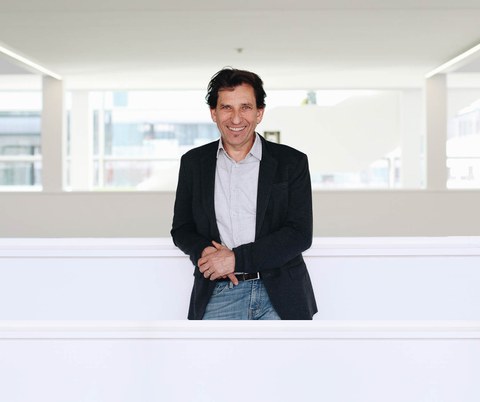Feb 22, 2022
ERC Proof of Concept Grant for Prof. Michael Sieweke

Prof. Michael Sieweke
Cell therapies have proven highly successful in treating a number of blood cancers. However, the existing treatments are not effective for solid tumors. Prof. Michael Sieweke and his group at the Center for Regenerative Therapies Dresden (CRTD) at TU Dresden would like to address this medical need by applying macrophages as cell therapies for solid tumors. The project was just funded by the prestigious Proof of Concept grant from the European Research Council (ERC).
Immunotherapies are a relatively new type of therapeutics that use engineered human immune cells. The cells are genetically engineered for identifying and destroying a specific type of tumor cells. In recent years, immunotherapies using engineered T-cells were shown to be exceptionally successful in treating a number of blood cancers. Nevertheless, the existing cell therapies have not been able to treat solid tumors that actually represent the majority of adult human cancers.
Researchers at the CRTD would like to develop novel cell therapies based on another type of immune cell – the macrophage. “A major function of macrophages is to destroy harmful material in our bodies, be it cellular debris, bacteria, or even cancer cells,” explains Prof. Sieweke, Alexander von Humboldt Professor at the TU Dresden, research group leader at the CRTD, and the leader of the project. “Macrophages can deeply infiltrate solid tumors and come in close contact with the cancer cells, something that other immune cells have difficulties doing. This – in principle – makes macrophages a perfect tool for cancer treatment.”
However, in order to develop macrophage-based cell therapies, scientists have to overcome many challenges. Although macrophages are able to destroy cancer cells, once they have become part of the cancer tissue they undergo a significant change. “Basically the tumor cells convert them to cells that support the growth and spread of the tumor,” says Dr. Ludwig Englmeier, Intellectual Property manager of the project. What is more, in order to use macrophages as cell therapy, researchers need to be able to multiply the cells in the lab, a technique known as cell culture. “Prior to our research, unlike the T-cells, human macrophages could not be expanded in cell culture. This was really a bottleneck for developing a therapy,” adds Dr. Englmeier.
To address these limitations, the Sieweke group generated engineered human macrophages, which can be expanded to large numbers in cell culture and are resistant to tumor-induced changes. With these changes, the newly engineered macrophages are able to infiltrate the tumor and destroy it. “With the help of the ERC Proof of Concept grant we now want to translate these exciting findings into a cell therapy against solid tumors,” adds. Prof. Sieweke.
The project, known as ONCOMAC, is going to focus on preparing and designing a preclinical proof of concept study for engineered human macrophages. The ONCOMAC should provide a basis for translating the results of Prof. Sieweke’s group into clinical trials. In particular, ONCOMAC will establish a number of complex analytical procedures which are a prerequisite for “First-in-human” studies of an Advanced Therapy Medicinal Product at the European Medicine Agency (EMA).
